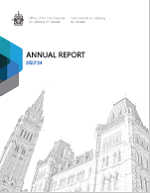Annual report 2023-24
Table of contents
- Commissioner's message
- Enabling transparency
- Spotlight on supporting transparency through improvements to the Registry of Lobbyists
- Ensuring compliance
- Spotlight on implementing the 2023 Lobbyists’ Code of Conduct
- Expanding awareness and understanding
- Spotlight on digital leadership
- Workings of the Office
- Looking ahead
Preface
This report is submitted to the Parliament of Canada pursuant to section 11 of the Lobbying Act R.S.C., 1985, c. 44 (4th Supp.).
Within three months after the end of each fiscal year, the Commissioner must prepare a report about the administration of the Lobbying Act during that fiscal year. The Commissioner is required to submit the report to the Speaker of the Senate and the Speaker of the House of Commons. Each Speaker tables the report in the Chamber over which they preside.
Commissioner's message
In my seventh year as Commissioner of Lobbying, I reflect on all that has been accomplished with my colleagues at the Office of the Commissioner of Lobbying. Through the careful and responsible management of our limited resources, we continuously deliver on our mandate while adapting as best we can to emerging issues and increasing workloads. I remain impressed and grateful for my team’s dedication in delivering value and excellence to the people of Canada in support of transparent and ethical lobbying.
Since becoming Commissioner, I’ve seen the number of active lobbyists at any one time increase from just over 6,000 in 2018 to nearly 9,000 in 2023. The number of active registrations surpassed the 4,000-mark in 2017 and climbed to over 6,000 in 2023. Communication reports have also reached record numbers, year after year, reaching 34,271 this past year.
The Lobbying Act recognizes that lobbying is a legitimate activity and that free and open access to government is an important matter of public interest. However, such lobbying must be transparent in accordance with the Lobbying Act and done in an ethical manner in accordance with the Lobbyists’ Code of Conduct.
While I continue to pursue improvements that enhance the transparency, fairness, clarity, and efficiency of the federal lobbying regime, most of the identified deficiencies can only be addressed through legislative amendments. There have been two missed opportunities to improve the Lobbying Act, first in 2017 and again in 2022. I continue to urge Parliament to avoid further delays and prioritize a review of the Act.
Several achievements realized in the last year are worth noting. In July 2023, the updated Lobbyists’ Code of Conduct (2023) came into force and my Office facilitated a successful transition. I also tabled a report on investigation to Parliament. To improve transparency, updates were made to the Registry of Lobbyists to link subject matters to their corresponding details in registrations.
As always, this annual report provides an overview of the outstanding work performed by the employees of the Office and I could not be prouder of their achievements.
Nancy Bélanger
Commissioner of Lobbying
Enabling transparency
What is regulated lobbying
Regulated lobbying is:
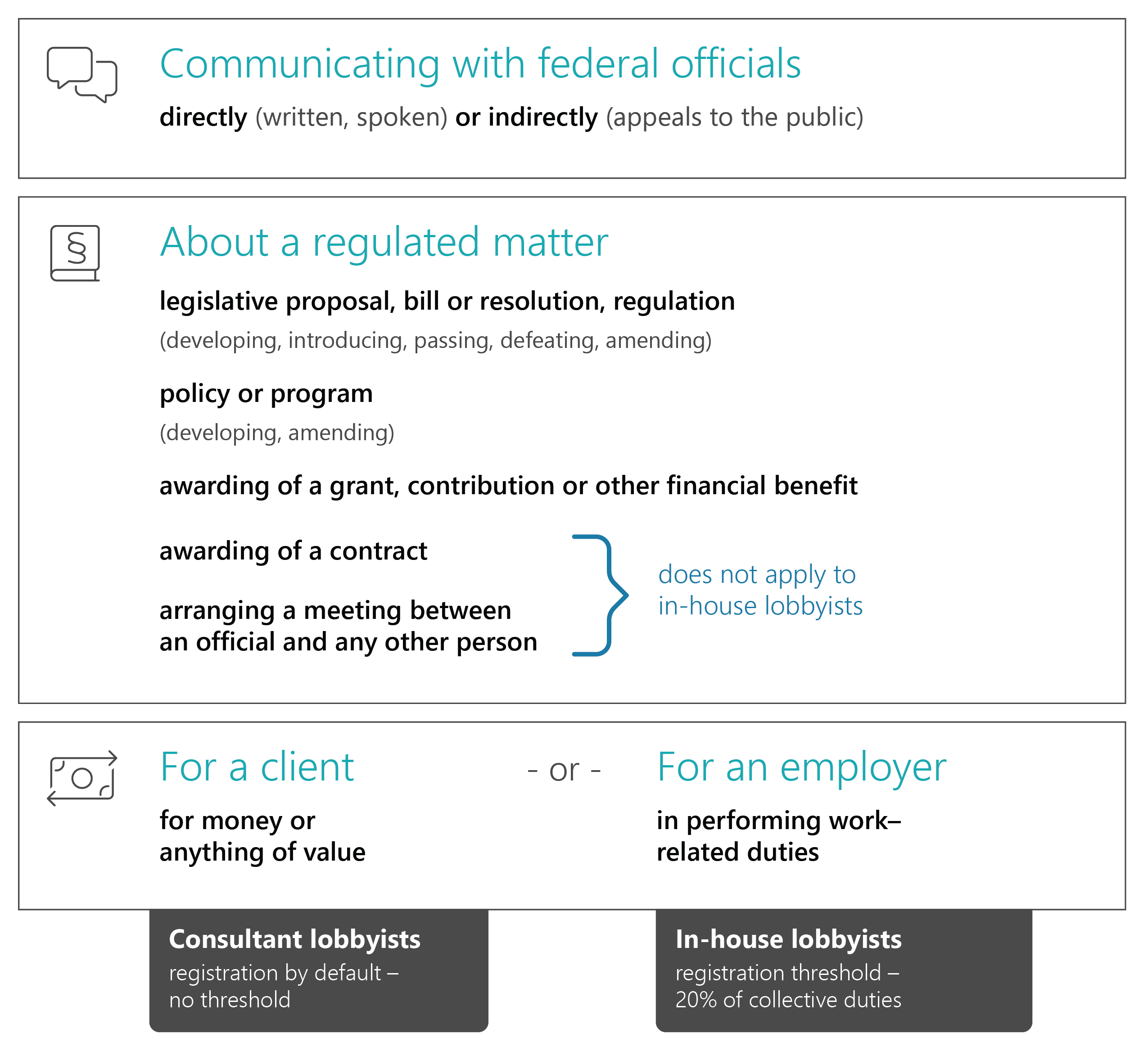
Regulated lobbying - Text version
Communicating with federal officials directly (written, spoken) or indirectly (appeals to the public)
About a regulated matter
legislative proposal, bill or resolution, regulation
(developing, introducing, passing, defeating, amending)
policy or program
(developing, amending)
awarding of a grant contribution or other financial benefit
awarding of a contract*does not apply to in-house lobbyists
arranging a meeting between an official and any other person*does not apply to in-house lobbyists
For a client for money or anything of value (Consultant lobbyists registration by default – no threshold)
or
For an employer in performing work-related duties (In-house lobbyists registration threshold – 20% collective duties)
Registry of Lobbyists
The Registry of Lobbyists is the primary tool to ensure transparency of lobbying. It offers Canadians a wealth of information, reporting tools and statistics. It also provides a powerful search function that allows the public to review and scrutinize the information that lobbyists must file when they lobby federal officials. The Office also offers complete downloadable data sets in a text file format (CSV) for both registrations and communication reports.
Registrations contain a wide range of information about lobbying activities, including:
- who is lobbying
- who benefits from the lobbying (incl. parent and subsidiary companies or corporations)
- the federal institutions lobbied
- the topics of lobbying activities, including the legislative proposals, bills, regulations, policies and programs, and grants, contributions and contracts
- the communication techniques used (i.e. spoken, written, grassroots campaigns)
- any government funding received
- any federal public offices previously held by the lobbyists
Consultant lobbyists must file a separate registration for each client. For in-house lobbyists (corporations or organizations), the most senior officer that is paid must file a registration if the corporation or organization meets the significant part of duty threshold.
Corporations must list all senior officers who lobby and all employees whose lobbying activities constitutes a significant part of their duties, while organizations must list every employee who lobbies.
Who engaged in lobbying in 2023-24
- 2,207 paid at least one consultant to lobby
on their behalf - 727 filed in-house registrations
- 652 filed in-house registrations and paid at least one consultant to lobby on their behalf
Active registrations and active lobbyists
As in recent years, new records were set for both active registrations and active lobbyists. Each month, the number of active registrations and active lobbyists attained a new record for that particular month as compared to previous years.
All-time highs of 6,032 active registrations and 7,336 active lobbyists were also observed, both in March 2024.
The figures below represent the number of registrations and lobbyists registered in each month.
Active lobbyists and active registrations - Text version
| Apr. 2023 | May 2023 | June 2023 | July 2023 | Aug. 2023 | Sept. 2023 | Oct. 2023 | Nov. 2023 | Dec. 2023 | Jan. 2024 | Feb. 2024 | Mar. 2024 | |
|---|---|---|---|---|---|---|---|---|---|---|---|---|
| Active registrations | 5,436 | 5,538 | 5,632 | 5,620 | 5,658 | 5,749 | 5,928 | 6,029 | 5,893 | 5,918 | 5,984 | 6,032 |
| Active lobbyists | 7,079 | 7,084 | 7,086 | 7,115 | 7,103 | 7,124 | 7,273 | 7,319 | 7,263 | 7,283 | 7,317 | 7,336 |
Government institutions in registrations and communication reports
Top-5 government institutions in
registrations
- House of Commons
- Prime Minister's Office
- Innovation, Science and Economic Development Canada
- Finance Canada
- Senate of Canada
Top-5 government institutions in
communication reports
- House of Commons
- Innovation, Science and Economic Development Canada
- Finance Canada
- Environment and Climate Change Canada
- Natural Resources Canada
Subject matters in registrations and communication reports
Top-5 subject matters in
registrations
- Economic development
- Industry
- Environment
- Taxation and finance
- Health
Top-5 subject matters in
communication reports
- Environment
- Economic development
- Industry
- Energy
- Health
Who was lobbied through an oral communication arranged in advance
| Designated public office holder | Total communication reports |
|---|---|
| Prime minister only | 43 |
| Officials in the Prime Minister's Office including where the prime minister also participated | 1,965 |
| Senators | 1,685 |
| Ministers | 2,291 |
| Members of Parliament | 12,483 |
| Deputy ministers, associate deputy ministers and assistant deputy ministers | 7,177 |
Spotlight on supporting transparency through improvements to the Registry of Lobbyists
As the Registry of Lobbyists is the primary tool for transparency in the lobbying of federal government officials, we continuously maintain and enhance the Registry to further support transparency.
Through much of the 2023-24 fiscal year, we worked on updating the Registry so that subject matters and their corresponding details are linked to one another in registrations, making this valuable information easier to understand.
As of April 1, 2024, lobbyists are required to update their active registrations before their next reporting period by connecting the subject matters to their related details in the “Lobbying information” tab found in registrations. Prior to this, information was displayed as two separate features, and it was unclear which subject matter was related to which details.
The Commissioner first announced her intention to link the relevant subject matter to the details in her 2022-23 Annual Report (see Looking ahead section). It was also communicated in the Office’s 2024-25 Departmental Plan, which was published on March 1, 2024 (see Highlights for 2024-25 section).
Through improved presentation of the information contained in registrations, we are enhancing the transparency of lobbying of public officials. As individual registrations have different mandatory re-certification dates, we expect all registrations to be converted to the new display by October 2024.

Communication reports
34271
Total communication reports filed
In 2023-24, a new all-time record was set for the total number of communication reports filed in the Registry of lobbyists. A total of 34,271 communications that were oral and arranged in advance occurred during the fiscal year, marking a 10.5% increase over the record established the previous year.
For the second year in a row, the month of November set a record for the highest monthly number of communication reports recorded with 4,435 communication reports.
These numbers represent the number of communications that took place between April 1, 2023, and March 31, 2024, and that were filed in the Registry by May 1, 2024. This increases the accuracy of the number of communications that occurred during the year since it includes the communications of March 2024 that must submitted by the 15th day of April.
Number of Communication reports for the fiscal year - Text version
| Apr. 2023 | May 2023 | June 2023 | July 2023 | Aug. 2023 | Sept. 2023 | Oct. 2023 | Nov. 2023 | Dec. 2023 | Jan. 2024 | Feb. 2024 | Mar. 2024 |
|---|---|---|---|---|---|---|---|---|---|---|---|
| 2,645 | 3,828 | 2,795 | 1,495 | 1,641 | 2,599 | 4,151 | 4,435 | 1,865 | 2,171 | 4,186 | 2,460 |
* Slight difference over previous reported yearly totals may occur due to late communication reports or deletions following verifications.
Communication Reports by Year - Text version
| 2023-24 | 2022-23 | 2021-22 | 2020-21 | 2019-20 | 2018-19 | 2017-18 | 2016-17 | 2015-16 | 2014-15 | 2013-14 | 2012-13 | 2011-12 | 2010-11 | 2009-10 | 2008-09 | |
|---|---|---|---|---|---|---|---|---|---|---|---|---|---|---|---|---|
| Total Communication Reports | 34,271 | 30,681 | 24,732 | 29,044 | 18,986 | 23,379 | 23,330 | 21,973 | 11,976 | 13,571 | 11,757 | 11,656 | 11,490 | 11,148 | 8,046 | 5,333 |
Timeliness of registrations and communication reports
Under the Lobbying Act, it is an offence to fail to register within the timelines prescribed or to file communication reports later than 15 days after the end of the month in which the communication occurred.
The Office accepts late filings to increase transparency in the Registry of Lobbyists and an investigation is conducted only where it would be necessary to ensure future compliance.
Commissioner Bélanger continues to recommend amending the Lobbying Act to allow a spectrum of sanctions to provide greater flexibility to dispense appropriate and proportionate remedies to address non-compliance with the Act, for example in cases of tardiness.
Late registrations
The vast majority, 91.8%, of registrations are filed on time. However, a total of 894 of registrations were filed late in 2023-24, a number which includes new registrations, reactivations, and updates to existing registrations.
For late new and reactivated registrations, consultant lobbyists accounted for nearly 97% of the 145 late new registrations and 87% of the 23 late reactivations.
Late updated registrations were somewhat more evenly distributed across consultants, corporations, and organizations. This represented 81% of all combined late registrations.
The Office educates lobbyists about their reporting obligations and where appropriate, monitors their compliance for one year.
Timeliness of registrations

Timeliness of registrations - Text version
Total registrations filed (as of March 31, 2024): 10,830
Filed on time: 9,936
% on time: 92%
Filed late: 894
Registration activity
Registration activity - Text version
| Type | Total Filed | Filed on time | % filed on time | Filed late |
|---|---|---|---|---|
| New | 3,001 | 2,856 | 95.2 | 145 |
| Updated | 7,357 | 6,631 | 90.1 | 726 |
| Reactivated | 472 | 449 | 95.1 | 23 |
| Total | 10,830 | 9,936 | 91.7 | 894 |
Type of late registrations
| Type | Consultant | Organization | Corporation | Totals |
|---|---|---|---|---|
| New | 140 | 4 | 1 | 145 |
| Reactivations | 20 | 3 | 0 | 23 |
| Updates | 227 | 281 | 168 | 726 |
| Total | 437 | 288 | 169 | 894 |
Data captured on 2024-03-31, for reports filed between 2023-04-01 and 2024-03-31.
Late registrations table
| Period | Consultant | Organization | Corporation | Totals |
|---|---|---|---|---|
| 1-15 days | 181 | 56 | 57 | 294 |
| 16-30 days | 66 | 62 | 25 | 153 |
| 31-90 days | 103 | 98 | 55 | 256 |
| 91-180 days | 66 | 50 | 22 | 138 |
| More than 180 days | 21 | 22 | 10 | 53 |
| Total | 437 | 288 | 169 | 894 |
Data captured on 2024-03-31, for reports filed between 2023-04-01 and 2024-03-31.
Late communication reports
While the majority of communication reports were filed on time (nearly 94%), any late reports hinder transparency. In total, 2,140 communication reports were filed late in 2023-24.
The vast majority of late reports were submitted between 1 and 15 days late but there were also far too many that were between 16 and 180 days late. Some were even submitted more than 180 days late.
Timeliness of communication reports

*data captured on 2024-03-31, for reports filed between 2023-04-01 and 2024-03-31, which would include oral and arranged communications filed late from previous years.
Timeliness of communication reports - text version
Total communication reports filed (as of March 31, 2024): 34,748
Filed on time: 32,608
% on time: 93.8%
Filed late: 2,140
Late communication reports table
| Period | Consultant | Organization | Corporation | Totals |
|---|---|---|---|---|
| 1-15 days | 385 | 720 | 283 | 1,388 |
| 16-30 days | 35 | 179 | 73 | 287 |
| 31-90 days | 60 | 174 | 39 | 273 |
| 91-180 days | 45 | 49 | 11 | 105 |
| More than 180 days | 6 | 66 | 15 | 87 |
| Total late | 531 | 1,188 | 421 | 2,140 |
*Data captured on March 31, 2024
Verification of communication reports
To ensure accurate reporting by lobbyists, the Office extracts a sample (5%) of new communication reports filed in the Registry of Lobbyists every month and asks the designated public office holders named in them to confirm whether the information submitted in the reports is complete and accurate.
By the end of 2023-24, designated public office holders named in 1,511 communication reports reviewed the information and confirmed that 1,281 reports or nearly 85% were complete and accurate. This marked a slight 3% decrease over 2022-23.
The 176 communication reports that were inaccurate contained 198 inaccuracies as some contained more than one error. The Office reaches out to registrants and requests that they correct inaccuracies.
Communication report verifications
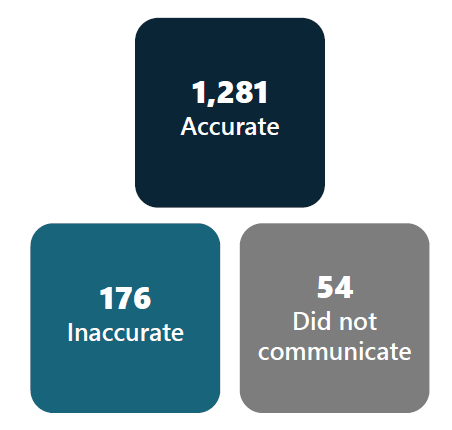
Communication report verifications - Text version
Accurate: 1,281
Inaccurate: 176
Did not communicate: 54
Common inaccuracies in communication reports
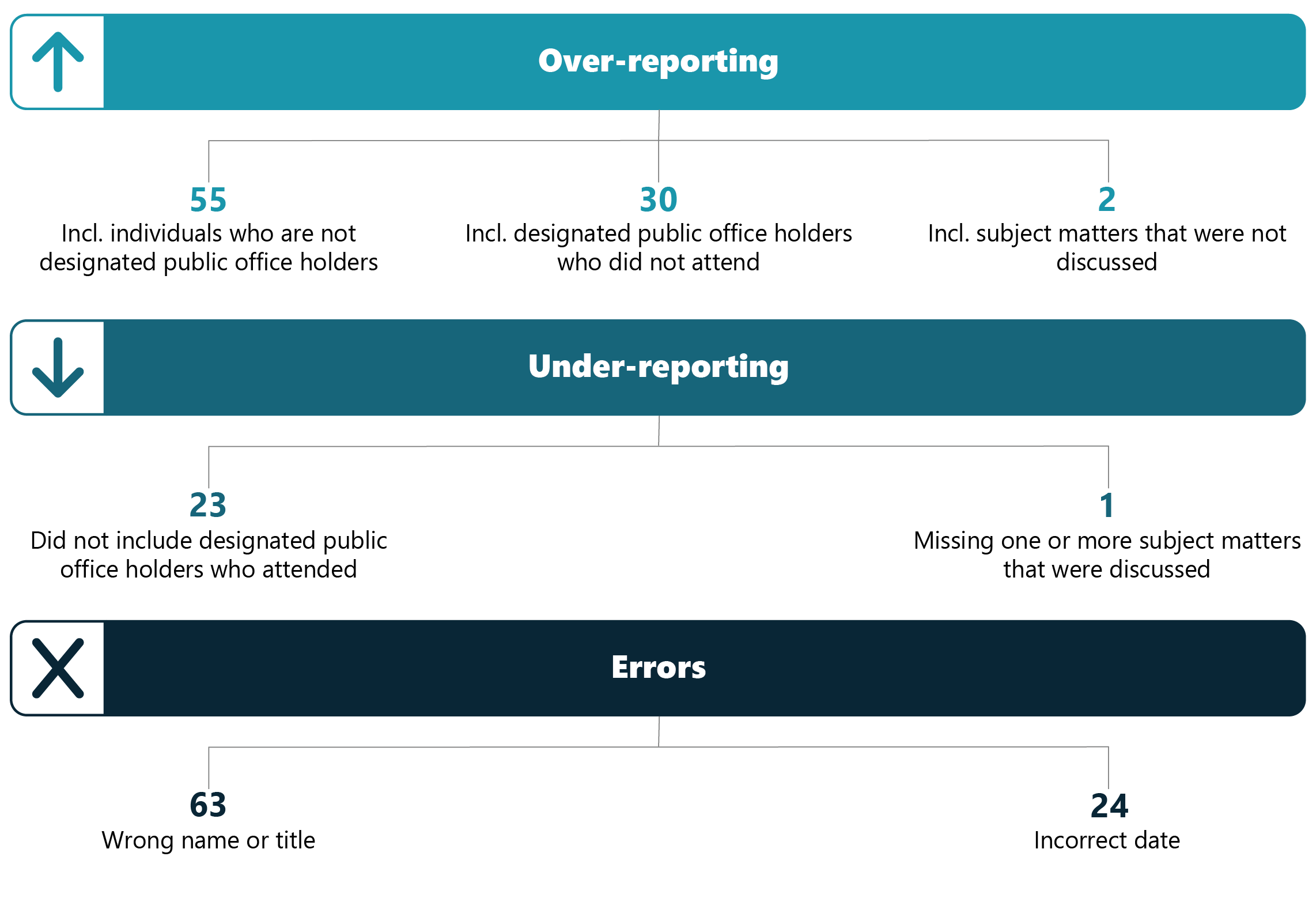
Common inaccuracies in communication reports - Text version
Over-reporting
- 55 Included individuals who are not designated public office holders
- 30 Included designated public office holders who did not attend
- 2 Not an oral and arranged communication
Under-reporting
- 23 Did not include designated public office holders who attended
- 1 Missing one or more subject matters that were discussed
Errors
- 63 Wrong name or title
- 24 Incorrect date
Registration and advisory services
To ensure compliance as well as accurate and consistent data in the Registry of Lobbyists, the Registration and Advisory Services team reviews all new, updated, and reactivated registrations to verify that they meet all the disclosure requirements outlined in the Lobbying Act.
In addition to these reviews, the team delivers information sessions to help lobbyists understand their obligations under the Lobbying Act and the Lobbyists’ Code of Conduct. The team also answers inquiries from stakeholders on a wide range of topics and reaches out to lobbyists to offer advice and support.
Reviewing registrations
Between April 1, 2023, and March 31, 2024, the team reviewed and posted 10,830 registrations, including new, reactivated, and updated registrations. This represents an average of 903 per month, a 16% increase over the previous year.
Of these 10,830 registrations, 1,441, or about 13%, were returned to the registrant once for corrections following a review by the advisory services advisors, while another 330, or about 3%, were sent back for correction more than once.
The overall number of new registrations increased by 12% while the number of updated registrations increased by 18% compared to the previous year.
Ensuring government funding information is updated
Registrants are required under the Lobbying Act to disclose any funding received from Canadian or foreign governments, including municipal, provincial, territorial, or regional governments. Government funding must be reported even if there is no relationship with the lobbying activities.
In November 2023, changes were made to the registration system to address a growing number of registrations containing outdated government funding information. The new process first notifies registrants that their information is outdated and encourages a prompt correction. If it is not updated, the system later warns registrants that they are now required to update their government funding information before they can proceed with any other activities in the system.
An automated system informed affected registrants of the upcoming changes a month prior to the November 20, 2023, implementation date. At that time, 704 registrations owned by 448 registrants contained outdated funding information, many of which were outdated by at least 18 months. Just 3 days after the new process was in place, that number had been reduced to 110 registrations owned by 76 registrants.
As of March 31, 2024, 10 active registrations remained out of date. The changes put in place will continue to remind registrants of their obligation to provide up-to-date and timely information on the government funding they receive.
Inquiries by source
| Type | Calls | Emails | Combined | Percent |
|---|---|---|---|---|
| Lobbyist (incl. representatives) | 2,738 | 2,089 | 4,825 | 85.7 |
| Potential lobbyist or client of a lobbyist | 71 | 193 | 264 | 4.7 |
| Public office holder (current and former) | 85 | 283 | 368 | 6.5 |
| General public | 77 | 67 | 144 | 2.6 |
| Other (e.g. academics) | 27 | 20 | 27 | 0.5 |
| Total | 2,976 | 2,652 | 5,628 | 100 |
Inquiries by topic
| Type | Calls | Emails | Combined | Percent |
|---|---|---|---|---|
| Registration support and details | 2,984 | 1,957 | 4,941 | 70.1 |
| Lobbying Act and regulations | 618 | 609 | 1,227 | 17.5 |
| Lobbyists’ Code of Conduct | 97 | 372 | 469 | 6.7 |
| Other (mandate, allegations, outreach requests) | 104 | 296 | 400 | 5.7 |
| Total | 3,803 | 3,227 | 7,030 | 100 |
Registration and Advisory Services service standards
Even with an increased volume of calls and emails, the Registration and Advisory Services team continued to deliver by providing exceptional service throughout 2023-24.
For the fifth year in a row, they reviewed all new registrations within three days, meeting their strict 100% service standard target. In fact, they achieved an outstanding 100% result in three out of five service standards, which also included responding to simple inquiries within two business days and processing voicemails within one business day.
In addition, they exceeded another service standard by responding to complex emails in 10 business days 99% of the time. A lone service standard was missed by a meagre 0.01%, representing 3 calls answered after more than 30 seconds.
Service standards for Registration and Advisory Services
| 2023-24 Service standards | Target | Result |
|---|---|---|
| Respond to simple email within 2 business days | 90% | 100% |
| Respond to complex emails within 10 business days | 85% | 99% |
| Respond to incoming telephone calls within 30 seconds | 80% | 79.9% |
| Review new registrations within 3 business days | 100% | 100% |
| Process voicemails within 1 business day | 85% | 100% |
Ensuring compliance
Compliance
The Compliance Directorate ensures that registrants, lobbyists, and former designated public office holders meet their obligations by conducting a variety of activities to enforce the Lobbying Act and the Lobbyists’ Code of Conduct.
In addition to 37 compliance files carried over from the previous year, which included 4 ongoing investigations, the Office initiated 16 preliminary assessments during the 2023-24 fiscal year. The Commissioner closed 14 files at the preliminary assessment stage and opened 2 investigations.
During the year, the Commissioner referred 2 investigations to the Royal Canadian Mounted Police (RCMP) as she had reasonable grounds to believe an offense occurred under the Lobbying Act. When the Commissioner refers a file to the RCMP, she must suspend her investigation.
In 2023-24, the RCMP laid charges in one case that was referred by the Commissioner and returned 1 file without laying charges. As of March 31, 2024, the Commissioner had ceased 3 investigations, one of which was the file regarding Andrew Burns, due to the disposition of the matter.
On March 31, 2024, there were 32 files at the preliminary assessment stage, 1 ongoing investigation and 6 suspended files. Early in April 2024, the Commissioner ceased 2 additional files, leaving 4 files suspended, one of which was suspended pursuant to subsection 10.4(8) of the Lobbying Act because the Commissioner became aware of an ongoing parallel investigation on the same subject matter.
In addition to investigation efforts, the Office conducts compliance assessments to address late filings of registrations and late filings of communication reports. Regular monitoring is conducted for a period of 1 year to ensure continued compliance. In 2023-24, 26 lobbyists were monitored.
Further to the coming into force of the updated Lobbyists’ Code of Conduct, the Office also sent 8 letters to registered lobbyists to ensure compliance with the hospitality rules of the updated Code.
Compliance statistics
| Investigation activities | Description | Total |
|---|---|---|
| Preliminary assessments initiated |
8 from external referrals |
16 |
|
8 from internal monitoring |
||
| Cases closed at the preliminary assessment stage |
6 no evidence of registrable lobbying |
14 |
|
2 insufficient evidence that significant part of duties was met |
||
|
4 no evidence of missing or incorrect information in a registration |
||
|
1 investigation not necessary to ensure compliance under the Lobbyists’ Code of Conduct |
||
|
1 combined with another ongoing preliminary assessment |
||
| Investigations ceased | 3 | |
| Investigations referred to the RCMP in 2023-24 | 2 | |
| Cases as of March 31, 2024 |
32 at the preliminary assessment stage |
33 |
|
1 ongoing investigation |
||
| Investigation reports tabled |
Investigation report – Dan Lovell |
1 |
Investigation report
Dan Lovell
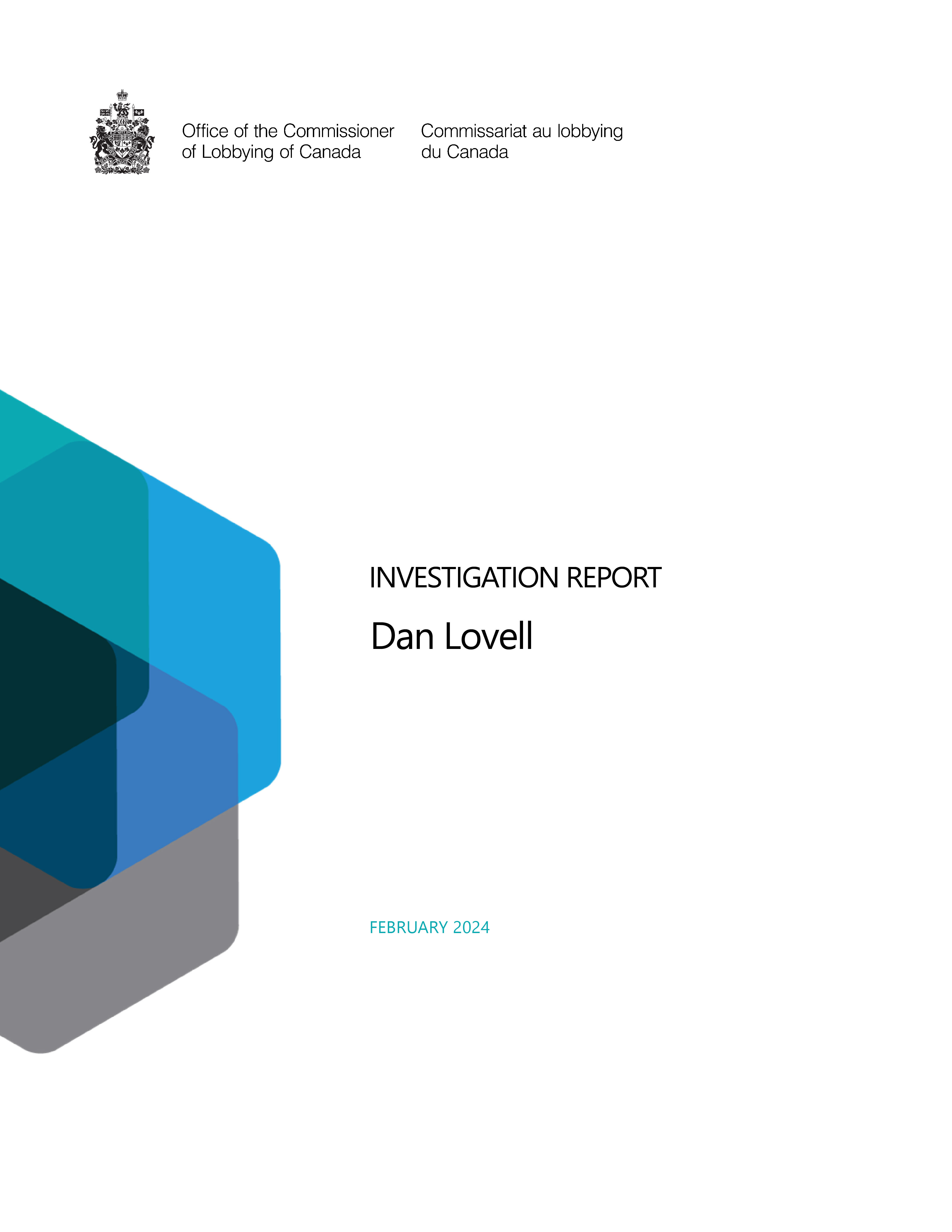
In a report on investigation tabled in February 2024, Commissioner Bélanger found that Mr. Dan Lovell contravened Rules 7 and 8 of the 2015 Lobbyists’ Code of Conduct by arranging meetings with and/or lobbying his former employer, Mr. Vance Badawey, Member of Parliament for Niagara Centre.
Mr. Lovell worked as an Executive Assistant for Mr. Badawey for four years, from February 2018 to the end of April 2022. Mr. Lovell also played a significant, campaign-manager-like role in Mr. Badawey’s re-election campaigns in 2019 and 2021. The investigation found that Mr. Lovell arranged for two clients to meet with Mr. Badawey in June 2022 and that he lobbied Mr. Badawey on at least two occasions in May and June 2022.
The Commissioner determined that an objective observer, apprised of the high degree of trust and reliance Mr. Badawey placed in Mr. Lovell during the four years they worked together as well as the significant role Mr. Lovell played in Mr. Badawey’s re-election campaigns, would conclude that Mr. Lovell and Mr. Badawey shared a relationship that could reasonably be seen to create a sense of obligation.
Charges laid under the Lobbying Act
Gerald Paulin
On March 14, 2024, the RCMP formally charged Gerald Paulin under the Lobbying Act for allegedly failing to file a return after undertaking to communicate and to arrange a meeting with a public office holder, and for allegedly receiving a payment contingent on the outcome of a registrable matter contrary to the Act.
The charges follow a referral by the Commissioner of Lobbying in September 2020.
When the Commissioner has reason to believe that an offence has been committed under the Lobbying Act, she must suspend her investigation and refer the matter to a peace officer such as the RCMP. This peace officer then conducts its own investigation.
At the time of publication of this report, the charges had not been proven in court.
Update from the Federal Court of Appeal
Democracy Watch v. Attorney General of Canada, 2024 FCA 64
On April 8, 2024, the Federal Court of Appeal heard arguments in Democracy Watch v. Attorney General of Canada, 2024 FCA 64. Democracy Watch sought to appeal a 2023 Federal Court decision which dismissed Democracy Watch’s application for judicial review of two reports issued by Commissioner Bélanger in 2020 relating to the 2015 Lobbyists’ Code of Conduct (Bergen report and O’Born report).
After brief oral arguments, the Court rendered its decision from the bench. It found that, considering the coming into force of the updated Lobbyists’ Code of Conduct on July 1, 2023, the appeal was moot and that it would be a waste of judicial resources and offend the principle of judicial economy to exercise the Court’s discretion to hear the appeal. Additionally, the Court was not persuaded that the Federal Court erred in awarding costs against Democracy Watch.
The appeal was dismissed with costs payable to the Attorney General of Canada.
Charges withdrawn in 2022 case
Andrew Burns
As mentioned in the Office’s 2022-23 Annual Report, the RCMP formally charged Andrew Burns in September 2022 for allegedly having engaged in unregistered lobbying on behalf of Marineland of Canada Inc. about Bill S-203 (Ending the Captivity of Whales and Dolphins). The charge stemmed from a referral to the RCMP by the Commissioner of Lobbying in late 2018.
In March 2024, the RCMP notified Commissioner Bélanger that the criminal proceedings involving Mr. Burns were resolved on February 27, 2024, when the Court imposed a peace bond on Mr. Burns.
According to the terms of the peace bond, Mr. Burns is ordered not to conduct any lobbying activities for a period of 12 months, with a narrow exception for lobbying related to the well-being of marine mammals in arranging for their transfer out of Marineland. Considering this peace bond, Crown prosecutors withdrew the charge under the Lobbying Act against Mr. Burns. In light of the disposition of this file, the Commissioner ceased the suspended investigation in late March 2024.
Exemption requests for the five-year restriction on lobbying
In 2023-24, the Office received 18 applications for exemptions to the five-year restriction on lobbying from former designated public office holders, more than twice the amount received the previous year. Another 2 applications were carried over from the previous year.
Of these 20 requests:
- 4 were granted
- 10 were denied
- 4 were withdrawn
- 2 were carried over to 2024-25
Exemption request service standards
| Standard | Performance | Notes |
|---|---|---|
| A letter sent by the Commissioner within 60 days of receiving an accurately completed application to either grant or to obtain further representations. | 78%* | The Commissioner informs the applicant of the decision. In cases where the recommendation by the Directorate is to deny the request, the applicant is offered the opportunity to submit additional information. |
| Applicant informed of the Commissioner’s final decision within 30 days of the applicant’s submitting further representations. | 100% | The Commissioner sends a letter informing the applicant of the final decision. |
| Exemptions granted are made publicly available within 48 hours of the effective date of the Commissioner’s decision. | 100% | All exemptions are published online. |
*The 78% performance rate is explained by 4 files that were completed beyond the 60-day service standard. One of these files was complex, one was overdue by 3 days while the other two were overdue by 1 and 6 days following the public service strike in April of 2023.
Spotlight on implementing the 2023 Lobbyists' Code of Conduct
The biggest story of 2023-24 for the Office was without a doubt the implementation of the third edition of the Lobbyists’ Code of Conduct. The 2023 Code came into force on July 1, 2023, following its publication in the Canada Gazette, Part 1 on May 27, 2023.
Designed with easy-to-understand rules, the 2023 Code sets out three expectations that are intended to guide lobbyists in complying with the Code’s rules of conduct:
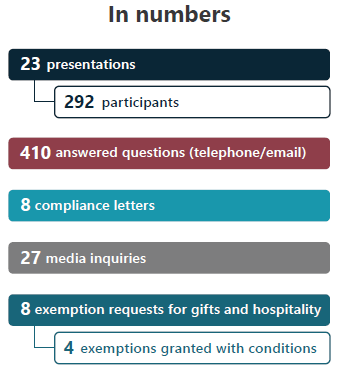
In numbers - Text version
23 presentations
292 participants
410 answered questions (telephone/email)
8 compliance letters
27 media inquiries
8 exemption requests for gifts and hospitality
4 exemptions granted with conditions
- transparency
- respect for democratic institutions, and
- integrity, honesty and professionalism.
As the 1-year anniversary of the updated Code approaches, we take the opportunity to reflect on what transpired during this past year. By all accounts, the transition from the 2015 Code to the 2023 edition of the Lobbyists’ Code of Conduct went smoothly.
In the period between its publication in May 2023 and March 31, 2024, we delivered 23 presentations on the updated Code to nearly 300 participants.
During that same period, we received a much higher than usual volume of questions in relation to the Lobbyists’ Code of Conduct.
By the end of the fiscal year, our advisors responded to 410 questions by email or telephone related to the Code alone. Questions related to hospitality and gifts, including sponsored travel, accounted for 74% of these questions.
Increased attention on gifts was reflected in the media. After the publication of the 2023 Code, we received 27 media inquiries about the updated Code. Media coverage focused primarily on sponsored travel. This topic was covered, often more than once in a variety of media outlets, including the Globe and Mail, the National Post, the CBC, and the Hill Times.
On the topic of gifts and hospitality, we received 8 exemption requests and granted 4 with conditions.
We also undertook monitoring activities and sent 8 compliance letters in relation to instances of hospitality that we became aware of through a variety of sources to ensure compliance with the new rules.
Overall, the transition from the 2015 Code to the 2023 Code has been successful. We are proud of this achievement.
Expanding awareness and understanding
Outreach and education
The Office engages with lobbyists and other stakeholders, including public office holders, media and the general public, to promote awareness of the Lobbying Act and the Lobbyists’ Code of Conduct. This supports compliance with both the Act and the Code.
In 2023-24, we met with 4,810 stakeholders through 124 presentations to lobbyists, public office holders, and other interested parties, such as universities and international organizations. Of these, 23 presentations to nearly 300 participants focused specifically on the updated Lobbyists’ Code of Conduct which came into force on July 1, 2023.
In addition, the Office leveraged opportunities for speaking engagements with its network of federal organizations to provide an overview of the lobbying regime and to promote the use of the Registry of Lobbyists as a valuable source of information.
The Office sent advisory letters to more than 40 individuals whose name appeared in media reports after being hired by government relations firms, organizations, and corporations that engage in federal lobbying. This helps potential lobbyists understand the Lobbying Act’s registration and reporting requirements.
The Office also sent 41 letters outlining the 5-year restriction on lobbying that applies to former designated public office holders.
Interactions with stakeholders
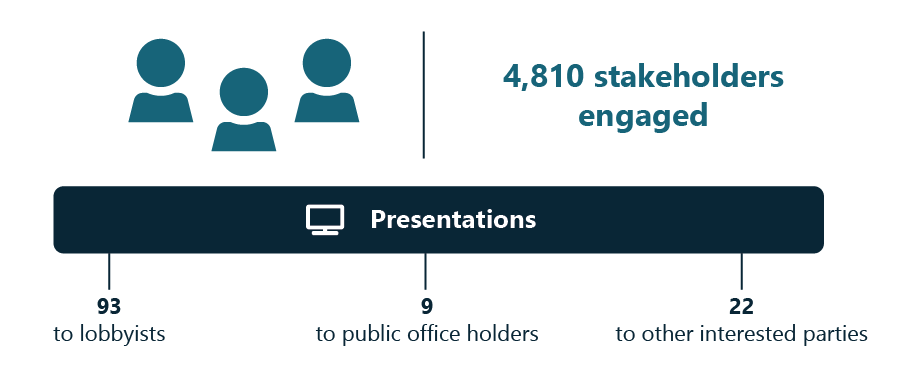
Interactions with stakeholders - Text version
4,810 stakeholders engaged
Presentations
- to lobbyists: 93
- to public office holders: 9
- to other interested parties: 22
Throughout 2023-24, the Office began to develop new tools and an engagement strategy to reach more stakeholders and expand their awareness of the federal lobbing regime. Several of these will be implemented in 2024-25, such as a “stay informed” feature on the website and the official launch of a LinkedIn page.
To help further increase various education and awareness offerings, an additional communications position is expected to be staffed in 2024-25.
Media engagement
The Office of the Commissioner of Lobbying is committed to providing the media with timely, accurate and appropriate information regarding Canada’s lobbying regime. It also provides support in helping journalists search the information in the Registry of Lobbyists.
In 2023-24, the Office received 80 media inquiries, a slight increase of roughly 14% over the previous year’s 69 inquiries.
The most common media inquiries were related to rules governing the lobbying regime, which represented 45% (36) of the total number of inquiries. Questions about the Lobbyists’ Code of Conduct accounted for 27 of the 36 inquiries received.
The Registry of Lobbyists was also a common topic with 30% (24) questions on how to locate specific information in the Registry, on seeking clarification on registrations or communication reports or simply to confirm the accuracy of their findings from their registry search.
Another 19% (15) were about the Office’s compliance activities, including investigations. While the Office receives question on this topic each year, 2023-24 saw these numbers increase.
The Office also increased the number of interviews it granted to journalists. In 2023-24, the Commissioner was interviewed by journalists on 8 occasions, compared to 2 the previous year.
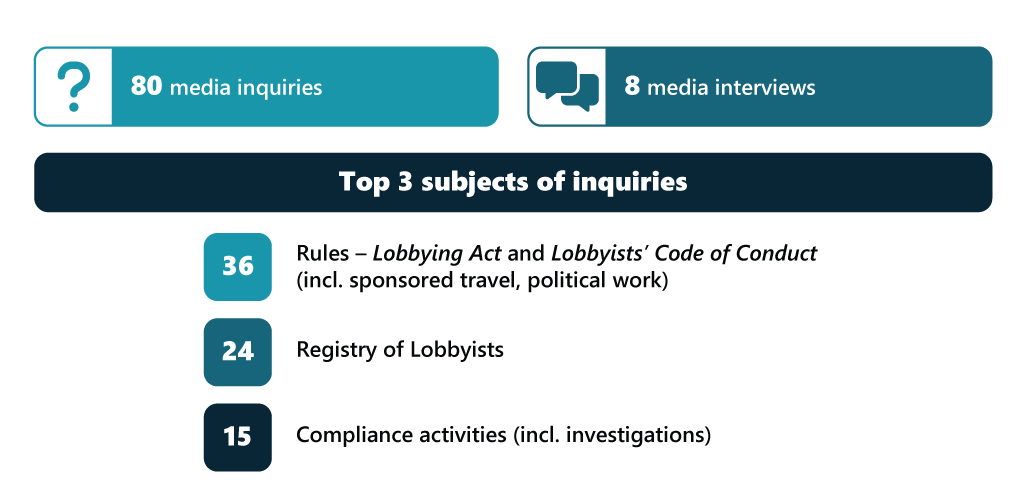
Media engagement - Text version
80 total media inquiries
8 media interviews
Top-3 subjects of inquiries
- Rules – Lobbying Act and Lobbyists’ Code of Conduct (incl. sponsored travel, political work): 36
- Registry of Lobbyists: 24
- Compliance activities (incl. investigations): 15
Common goals of transparency and accountability
A healthy lobbying regime is one that supports public confidence in the integrity of government decision-making. Canada’s long-standing experience in regulating lobbying activities positions the Office well to share its experience and contribute to the discourse around transparency and ethical lobbying of government officials.
Common standards for lobbying transparency and accountability support the development of systems that can strengthen democracies. The ongoing collaboration with provincial and international counterparts provides opportunities to share expertise among participants to help foster effective, accountable, and inclusive institutions at all levels.
Lobbyists Registrars and Commissioners Network
Each year, Commissioner Bélanger and employees of the Office participate in two meetings with the Lobbyists Registrars and Commissioners Network (LRCN) to share best practices and provide updates related to their respective regime. The LRCN typically meets twice a year, once in person and once virtually.
The Office of the Registrar of Lobbyists for British Columbia hosted in the in-person meeting held in Victoria, British Columbia at the end of September 2023. Members met once more in February 2024, virtually this time.
Fall 2024 will see the commissioners and registrars meet in the nation’s capital as the Office has its turn to host the inperson meeting.
Council on Governmental Ethics Laws (COGEL)
The Council on Governmental Ethics Laws COGEL is a largely U.S.-Canada-based professional organization for government regulators and others working in ethics, elections, freedom of information, lobbying, and campaign finance.
In December 2023, the annual COGEL Conference was held in Kansas City, Missouri. The conference allows members to share a wealth of knowledge and expertise. During the 2023 edition, the Office presented in three session :
- Commissioner Bélanger provided an update on developments in the Canadian federal lobbying landscape.
- Commissioner Bélanger also presented in a session on achieving legislative and other changes, speaking of the Office’s recent experience in updating the Lobbyists’ Code of Conduct.
- The Office’s Communications manager was a panelist on a session about leveraging data and other insights often hiding in plain sight to support decision-making. The panel was moderated by the Director of Communications, Outreach and Planning for the Office of the Conflict of Interest and Ethics Commissioner.
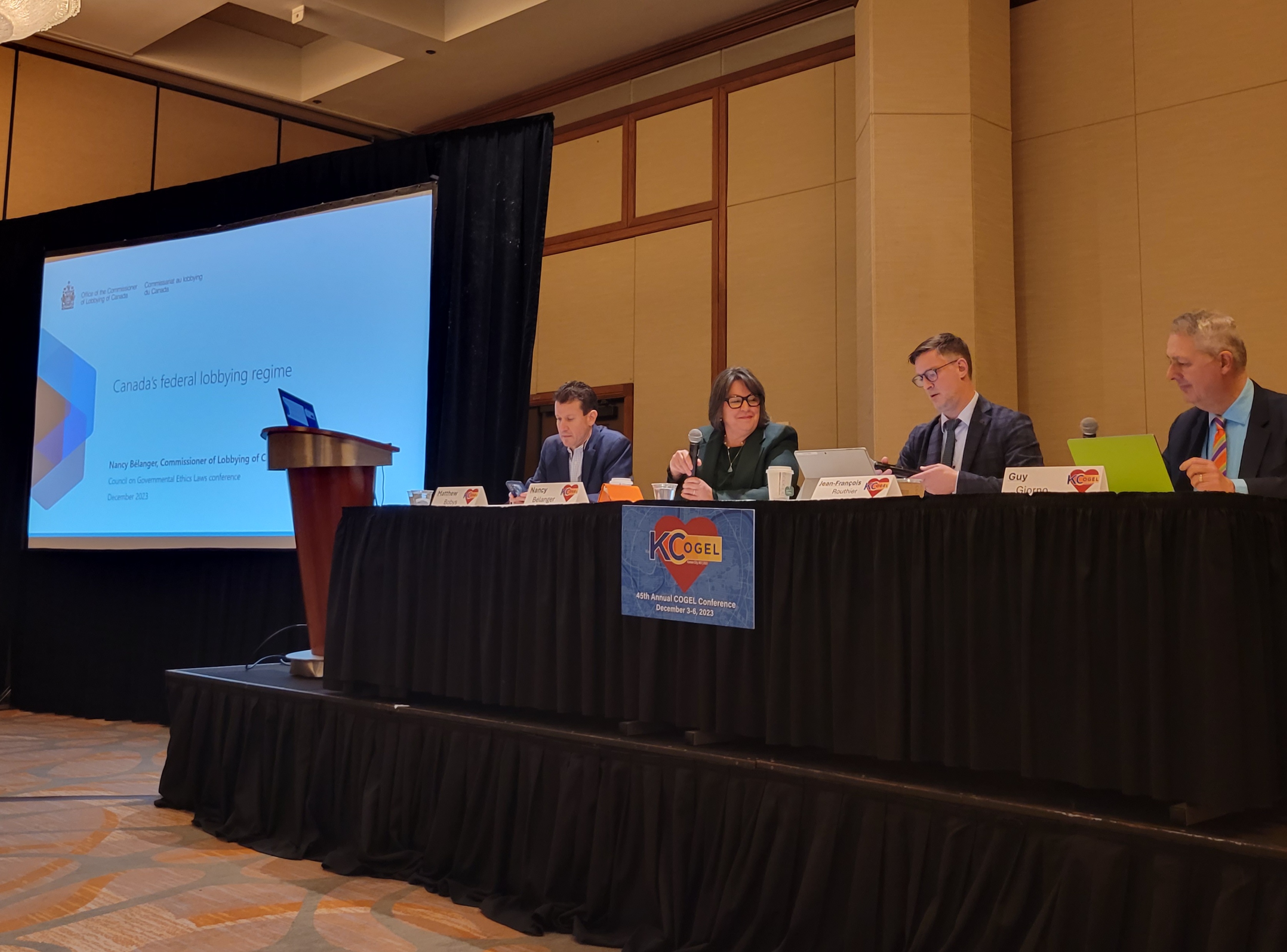
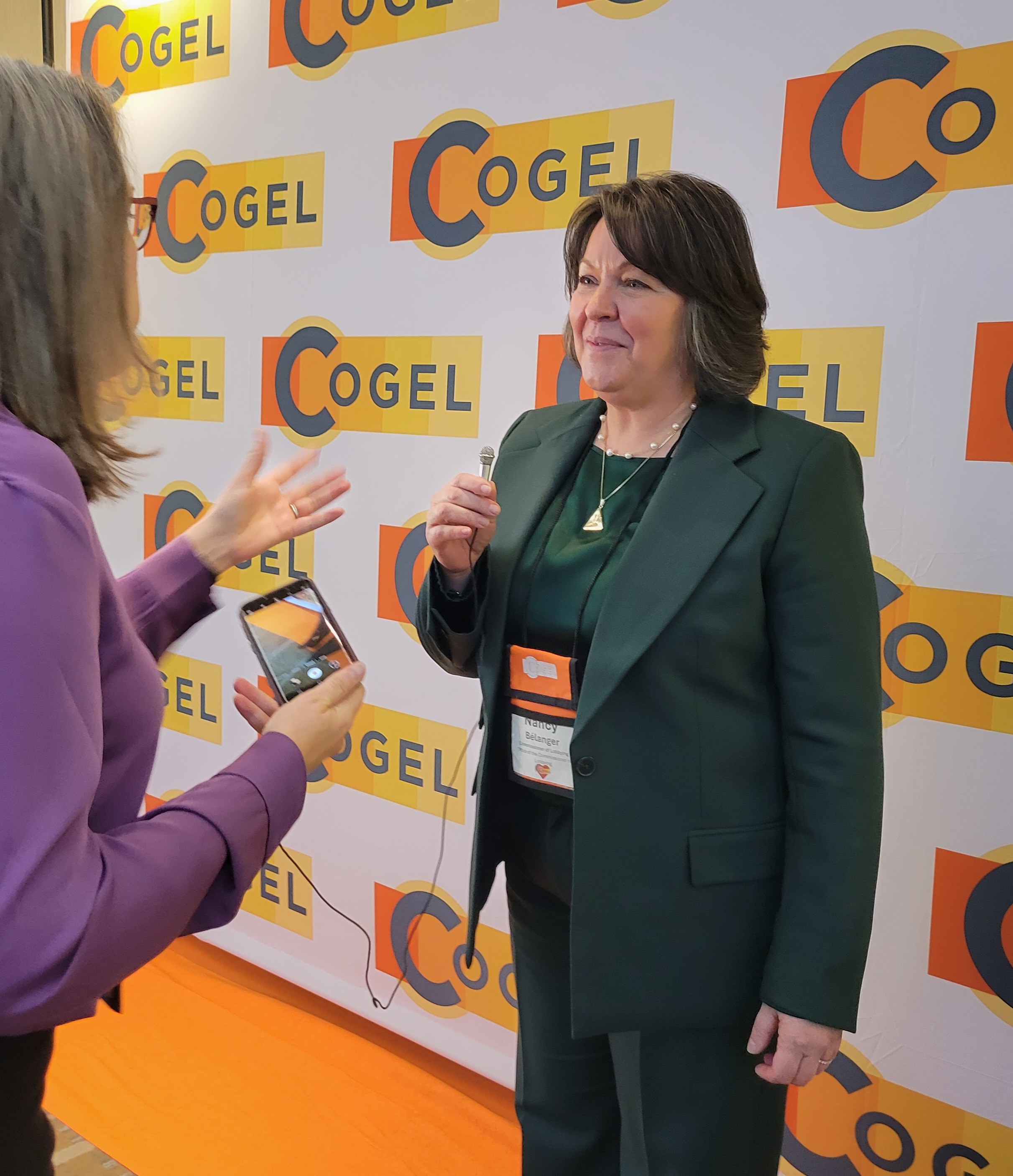
Organization for Economic Cooperation and Development (OECD)
As Canada’s lobbying regime is often cited as a model on the international stage, we continue to engage with international bodies such as the Organization for Economic Cooperation and Development (OECD).
In line with this approach, Commissioner Bélanger was a panelist at an OECD plenary session titled Reinforcing democracy: The role of integrity amongst elected and appointed officials which drew over 3,600 attendees on May 23, 2023.
The following day, on May 24, Commissioner Bélanger also presented in a session titled OECD trusted dialogue on getting influence right which was attended by OECD members, international regulators and global enterprises.
Throughout the year, the Office continued to engage with the OECD on its public integrity indicators project and participated in a virtual panel and a roundtable in October 2023.
European Union (EU)
In November 2023, the Commissioner and employees of the Office met with a delegation of the European Union to Canada to share the Office’s experience in administering Canada’s lobbying regime. This presentation was held jointly with the Office of the Conflict of Interest and Ethics Commissioner. Shortly thereafter, Commissioner Bélanger took part virtually in a meeting of the European Parliament’s Constitutional Affairs Committee. During the session, she provided information about the Canadian regulatory experience as the committee performed its review of the EU transparency Register.
The EU is working towards strengthening transparency and integrity across EU institutions by setting up an independent EU ethics body, in keeping with a resolution passed by the European Parliament in 2021.
Parliamentary activities
The Commissioner of Lobbying reports to Parliament through the Standing Committee on Access to Information, Privacy and Ethics (ETHI). Throughout 2023-24, Commissioner Bélanger testified before the Committee on three occasions.
First, on May 12, 2023, Commissioner Bélanger appeared before the Committee along with employees of the Office of the Conflict of Interest and Ethics Commissioner’s Office to discuss the Main Estimates. Given that Commissioner Bélanger sent the Committee a letter in March 2023 in response to issues raised by witnesses related to the renewal of the Lobbyists’ Code of Conduct, the Commissioner unsurprisingly received several questions in this regard. During her testimony, she informed members of the Committee that the updated Code was sent to the Canada Gazette, Part 1, with publication expected at the end May. Later that month, she wrote to the Committee to confirm that the Lobbyists’ Code of Conduct (2023) would be published in the Canada Gazette the following day.
On June 20, 2023, Commissioner Bélanger once again appeared before the Committee, this time to discuss the postemployment restriction on lobbying for former designated public office holders. During this appearance, Commissioner Bélanger highlighted some of her concerns with the Lobbying Act and recommendations to address these concerns. She reiterated the long overdue need to amend the Lobbying Act and her readiness to assist in this important work, which generated several media headlines.
“The Lobbying Act needs to be reviewed. I can’t say it enough: There are some major gaps.”
Nancy Bélanger
Commissioner of Lobbying
On October 10, 2023, Commissioner Bélanger appeared jointly with the Information Commissioner to discuss their respective annual reports. Commissioner Bélanger answered several questions related to sponsored travel and once again expressed concerns about the long overdue review of the Lobbying Act.
Spotlight on digital leadership
In-line with the Government of Canada’s Digital Ambition, members of our IT team set-out to find solutions to mitigate the Office’s reliance on costly closed-source software and offer increased value for Canadians.
Along with a colleague from the Office of Privacy Commissioner (OPC), our Manager of IT Operations and Systems Management, André Lagacé, and our IM/IT Support Technician, Charlie Eid, identified solutions, developed, and implemented a path forward to replace Oracle-Java in favour of open-source software.
In December 2023, the Treasury Board Secretariat’s (TBS) Office of the Chief Information Officer took interest in their response to this common government challenge. TBS sought insights into their experience in migrating Oracle-Java installations to open-source solutions for its workstations, servers, applications, and infrastructure.

TBS also invited them to contribute to the development of a case study to be presented at the GC Enterprise Architecture Community of Practice. Our team members presented and answered questions on behalf of our Office and the OPC at a meeting attended by approximately 125 participants from various government departments in January 2024.
When TBS developed a Java Solution Optimization Technical Playbook in March 2024, our team members were also asked to provide input. The collaboration between the three offices captures lessons learned, allowing the broader government community to benefit from their experience and fast track their own evolution.
Their collaboration resulted in the TBS nominating them for a Digital Government Community Award in the category of “outstanding digital leadership award” for their integrated approach in tackling the Java transformation challenge. These awards recognize excellence in delivering results for Canadians through digital tools and practices, with a focus on highimpact initiatives, exceptional contributions, and best practices in implementing the Government of Canada’s Digital Ambition.
Although they ultimately did not win the award at the ceremony held on May 8, 2024, we are incredibly proud of their leadership and contribution in delivering more value for Canadians.
Workings of the Office
The Office is committed to delivering on its mandate to support ethical and transparent lobbying of federal officials while also meeting important organizational obligations.
Increasing capacity
Depth of capacity is a primary risk for the Office, as identified in a corporate risk profile (2022). While somewhat mitigated by the modest increases to funding levels in Budget 2021 and Budget 2023, as a small organization, the ability to reallocate resources is limited.
In 2023-24, 8 indeterminate employees joined the Office. These new hires spanned the entire organization, providing muchneeded support to our advisory, communications, compliance, and corporate functions. Despite these hiring efforts, our actual complement of staff on strength is 31 employees.
As a minimally-resourced micro-organization, the Office is always in danger of not having adequate depth of capacity to sustain delivery of the mandate. Each departure and unfilled position has a real impact on the Office’s ability to fulfill its core responsibility and deliver on the wide range of organizational responsibilities that apply to all government departments, regardless of department size or resourcing. Staffing and recruitment are continuously a top priority for the Office, in a dedicated effort to reach its full complement of 37 employees.
Mental health strategy
The Office launched its first mental health strategy in 2019-20. Since then, the Mental Health Committee remains active in developing annual action plans to support employee health, safety and well-being through collaboration, inclusiveness, respect and continuous learning.
The Mental Health Committee strives for a balance of education and team-building, providing information in a positive, open environment. Activities in 2023-24 included a viewing session of videos offered by mental health providers and a team activity with prompts to encourage open discussion on mental health issues that may arise in the workplace. Throughout the year, the committee continued to share mental health information and resources and to promote services available through the Employee Assistance Program, LifeSpeak, and introduced the new EAP Torchlight services targeted at caregivers.
The Office also has 5 employees who are certified as mental health first aiders.
Values and ethics
In response to the Deputy Ministers’ Task Team on Values and Ethics Report to the Clerk of the Privy Council, the Office updated its own Values and Ethics Code in the winter of 2024.
As ethics is a core value of the Office, only minimal changes were required to the pre-existing version. The values and ethics code of the Office also aligns with the Values and Ethics Code for the Public Sector.
Ongoing discussions around values and ethics, both formal and informal, occur throughout every fiscal year. Following the update of the Values and Ethics Code, employees participated in a mandatory session to promote awareness and understanding of the code and expected behaviours. This also allowed employees to engage in meaningful discussions on the subject.
Internal communications
The Office’s first intranet was introduced in December 2023. The intranet provides much needed unified access to wideranging external and internal resources for public servants, such as policies, directives, forms, human resources, pay and pension, well-being and much more.
The intranet was well-received by employees of the Office, with some having expressed gratitude for reducing their ever-growing list of bookmarks! It has also been very useful in the onboarding of new employees, particularly in a hybrid environment.
Accessibility
In December 2023, the Office published its first progress report on the implementation of its Accessibility Plan 2023-25, in accordance with the Accessible Canada Act.
The Office’s accessibility plan sets out 10 goals to support accessibility in the areas of employment; design and delivery of programs and services; built environment; information and communication technology (ICT); and communication other than ICT.
The Office surpassed the number of persons with a disability (15.38%) in the workforce availability (9.15%), ranking third across the public service.
To support accessibility for employees and stakeholders in the delivery of activities and mandate, the Office:
- promoted the use of the Government of Canada’s accessibility passport for employees
- created sections on its intranet dedicated to content related to diversity, inclusion and accessibility, which includes plain language, and a digital accessibility toolkit
- prominently displayed accessibility-related infographics in a strategic high-traffic area of the office
- updated its staffing procedures to ensure staffing processes are exempt of biases or barriers for persons with disabilities, as required by the Public Service Employment Act
- Identified evacuation assistants to help persons with disabilities in evacuating the building in the event of an emergency
Looking ahead

Guided by our new strategic plan for 2024-26, projects and plans for the new fiscal year are once again ambitious. Current efforts are focused on updating our interpretation bulletins to help lobbyists and other interested parties understand how we interpret the Lobbying Act.
We will continue expanding on our awareness and engagement efforts by providing new products and tools, with an added focus on increasing our reach and improving proactive communications.
Building on Registry improvements aligning subject matters and details in registrations, the Office will work toward enhancing transparency by creating mechanisms to identify both the general subject matter as well as the related details in communication reports.
We will prioritize staffing efforts to build our capacity. As a microorganization that operated with no more than 28 staff for most of its existence, having 9 more employees enhances our capacity to operate and improve the Registry, to offer and deliver education and information about regulated lobbying to stakeholders, and to perform compliance work as the number of registered lobbyists and instances of lobbying continue to increase.
In 2024-25, we plan to have a third party assess the accessibility of our website and the Registry of Lobbyists. Following this analysis, we will work to address any identified barriers to accessibility. We also plan to seek feedback directly from the users of our website and the Registry.
Canada’s federal lobbying regime will also mark its 35th year in September 2024.
First enacted as the Lobbyists Registration Act in 1989, today’s Lobbying Act evolved over its first two decades to enable and require transparent and ethical lobbying of federal officials.
Given that more than 15 years have passed since the Lobbying Act and its regulations were updated, we continue to explore possible improvements so that our federal lobbying regime can continue to remain effective and be the best of its kind. We will also continue to build on the preliminary recommendations made in 2021, to support the Standing Committee on Access to Information, Privacy and Ethics (ETHI) in any future review and amendments to the Act.
As we undertake the next year, Canadians can count on our Office to deliver its mandate with excellence.
Copyright statement
This publication is available online and in PDF format at lobbycanada.gc.ca.
Accessible formats are available on request by contacting info@lobbycanada.gc.ca.
Permission to reproduce
Except as otherwise specifically noted, the information in this publication may be reproduced, in part or in whole and by any means, without charge or further permission from the Office of the Commissioner of Lobbying of Canada, provided that due diligence is exercised in ensuring the accuracy of the information reproduced; that the Office of the Commissioner of Lobbying of Canada is identified as the source institution; and, that the reproduction is not represented as an official version of the information reproduced, nor as having been made in affiliation with, or with the endorsement of the Office of the Commissioner of Lobbying of Canada.
For permission to reproduce the information in this publication for commercial redistribution, please email: info@lobbycanada.gc.ca.
© His Majesty the King in Right of Canada as represented by the Commissioner of Lobbying of Canada, 2024
Catalogue No. Lo1E-PDF
ISSN 1925-9522
Aussi offert en français sous le titre : Rapport annuel 2023-2024, Commissariat au lobbying du Canada
- Date modified:

